UTA is more than just a place for learning. It’s a place for being involved in and a part of helping the community.
It’s just going to make them more well-rounded and prepare them for the world.

WHITLEY WISDOM
Alum Reflects on College and Career 10









Distinguished
MASTERFUL MARKETERS Students Shine in International Competition 23 LOCKHEED LEARNING Work Program Affords Real-World Experience 4 business maverick UTA COLLEGE OF BUSINESS MAGAZINE THE FALL 2O22 Professor Studies Accountability of Accounting 16 CONNECTION & Collaboration
Increasing Engagement
As we shake off the remaining shackles of the SARS COVID 19 pandemic, we look forward to the opportunity to fully reengage with our Maverick community, especially those outside the 420 acres that comprise our amazing campus.
Given the restraints imposed by the pandemic, there may be no more important time for this essential outreach to occur. Students, after two years of juggling a dizzying array of on-line, hybrid and face-to-face classes, are looking forward to a first normal college experience since 2019. The relief we all feel about a return to nor malcy is palpable.
For many of our students, college serves as the bridge between their high school days to what ultimately will be their professional life. For others, a college degree, whether it be a bachelor's, master's or doctoral degree, is a conduit to achieve great knowledge, a better job or increased social mobility. Regardless of the reason a student decides to attend college, engagement remains an essential com ponent of the college experience. In this regard, faculty, staff and student organizations play essential roles in transforming student lives and preparing them for their professional lives. Alumni are also an essential link in a student’s transformation. The connection to those who have gone before them is a powerful association for students. Alumni can strengthen that association in a number of ways: by interacting with students during Business Week, becom ing a DREI mentor, endowing a scholarship, becoming a member of the Dean’s Leadership Circle or joining MavONE, the College's new online networking platform.
The College is also making substantial inroads in increasing our engagement with corporate entities and the community. Through the design of special, tailor-made curricula and offering in-depth and timely seminars, symposiums and research, we are meeting business and community leaders where they live, providing them tools to gain a better and deeper understanding of today’s critical issues. As detailed in the following pages, whether it be diversity and inclusion, business analytics, the state of DFW real estate, learning how businesses cope with adverse circumstances, address ing the climate effects on critical infrastructure or understanding the impact of the expanding corporate social responsibilities have on company reporting requirements, our faculty and staff are working hard to assist our Maverick community on addressing the challenges of today’s environment.
Mavericks have always made an impact in the growth and devel opment of the Dallas-Fort Worth Metroplex. Nowhere is this more evident than the leadership Tarrant County Judge B. Glenn
Whitley (BBA, Accounting, 1976) displayed during the SARS COVID 19 pandemic. Faced with unprecedented circumstances, and the responsibility for the health and safety of more than 2.1 million North Texans, Judge Whitley drew from his vast public and private experience to successfully guide Tarrant County through the pandemic. We are certainly proud that Judge Whitley is a
Business Maverick!
As you can see, the College of Business has risen to the challenge of the pandemic and beyond. With our engaged support system in place, anything is possible. We are excited to see what this year brings!
We are Maverick strong!
Go Mavericks!
Harry M. Dombroski Dean of the College of Business
NEWS & NODS
• Lockheed Martin Program Affords Real-World Learning
• Third Time’s a Charm: MAVS 100 Showcase
• Real Estate Conference Connects Public, Private Sectors
• Managing Diversity Certificate Program Launched
• STEM Designation Augments Economics Degree
DISTINGUISHED ALUM & DONOR PROFILE
• Businessman, County Commission Leader and UTA Alum Glen Whitley Summarizes Insights from a Successful Dual Career with One Word: Collaboration
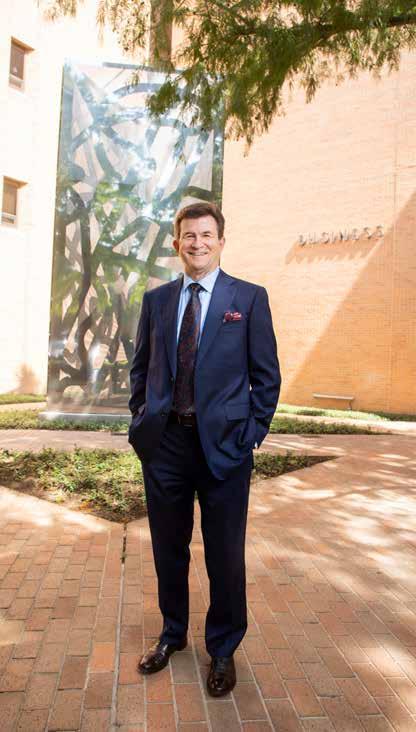
RESEARCH MAVERICKS
• Bin Srinidhi Studies How Accountability Underscores Accounting
• C.Y. Choi Examines Potential Idiosyncratic Nature of Economics
• Traci Freling Applies Meta-Analysis Methods to Marketing Research
FACULTY SPOTLIGHT
• Christy Spivey Embraces a Passion for Improving Online Education
STUDENT SPOTLIGHT
• Marketing Students Succeed at International Conference
• Goolsby Scholars Shine at Home and Abroad
• Business Week Draws Professionals from Range of Industries
• Makeover Enhances Space for Student Gatherings
• Campus Events Engage Students Past and Present
THE
business maverick
UTA COLLEGE OF BUSINESS MAGAZINE ISSUE NO. 4, FALL 2022

COLLEGE OF BUSINESS LEADERSHIP TEAM
Harry M. Dombroski, Dean
Dr. Greg Frazier, Senior Associate Dean
Dr. Myrtle Bell, Associate Dean for Diversity, Racial Equity and Inclusion
Dr. Wendy Casper, Associate Dean for Research
Dr. Fernando Jaramillo, Associate Dean for Students and Programs
Rebecca Neilson, Assistant Dean
MAGAZINE STAFF
Editor: Rebecca Neilson
Publication Consultants/Writers: Hardee Partners, LLC
Supporting Staff: College of Business, Dean’s Office
Contributing Photographers: Ellman Photography, Myalinda Martinez, Jordan Mulkey
Designer & Illustrator: Jennifer Hart
The Business Maverick magazine is published once a year by UTA College of Business for alumni, fac ulty, staff and friends of the college. Reproduction in whole or in part with out written permission is prohibited. The comments and opinions expressed in this magazine do not necessarily represent those of The University of Texas at Arlington or the faculty of the College of Business. For more information, contact Rebecca Neilson, College of Business, 817.272.2643
An equal opportunity/affirmative action employer
2 3FALL 2022 | UTA.EDU/BUSINESSTHE BUSINESS MAVERICK, UTA COLLEGE OF BUSINESS MAGAZINE
PRESIDENT'S LETTER MAVONE 10 4 22 16 23 30 31
FROM THE DEAN'S DESK INSIDE THIS ISSUE
Work Program Offers Students Opportunity to Apply Lessons in Real-World Settings

When management student
Eric Wright heard about UT
Arlington’s work experience program with Lockheed Martin, he almost passed on the opportunity to apply.
Lockheed. Engineers. Nope.
“But I looked into it and found that they had both the technical and non-technical side,” Wright said. He is glad he threw his résumé into the ring. He has worked for three months as a business analyst in the company’s Missiles and Fire Control Business Area.
The Lockheed Martin College Work Experience Program (CWEP) is no internship program; it’s so much more, Wright discovered.
“I actually would attend meetings with leader ship as kind of a fly on the wall and observe and learn from there,” said Wright, who has his sights set on a management position after completing his bachelor’s degree this fall. “I got to work with many of the multifunctional teams. I can say the biggest thing that I gained from it was both practical and soft skills. One of my favorite quotes about soft skills is, in a world where job roles are changing rapidly, soft skills will be one of the few constants.”
CWEP is an initiative designed to increase meaningful engagement between UTA and Lock heed Martin by providing students experiential, hands-on learning opportunities. The program is open to undergraduate and graduate students who work up to 19 hours per week during school se mesters. Applicants must have completed at least one semester at UTA and be enrolled as a fulltime student during their time with Lockheed. Students are employed for a minimum of two consecutive semesters.
Annmarie Cañas, the UTA CWEP coordinator,
said 35 students are working in the program, 20 from the College of Business, either face-to-face at the company’s Grand Prairie facility or through a mix of in-person and virtual. UTA and the University of Central Florida are the only two schools who partner with Lockheed Martin on this program.
“We have received so much positive feedback from the leaders at Lockheed Martin in regard to our students being prepared, having relevant coursework and really having an edge,” Cañas said.
Software engineering major Bailey Tan Nguyen echoed Wright’s praise for the practical experience gained in the program.
“You are basically treated as any other co-work er,” he said. "You're doing the same things as your co-workers, but on a smaller scale since you're not working full time. You gain so much experience in the way you speak to your co-workers, how you write emails, how you formulate ideas and how you talk to your managers and leadership. And I feel like those kinds of skills only come from experience.”
Nguyen worked in systems engineering dealing with documentation requirements. Wright has been able to apply lessons learned in his account ing and finance courses on earned value manage ment techniques for monitoring and assessing project performance and progress.
“You're doing certain things in class, and you're thinking, man, I'll never do this, and then it shows up,” Wright said. “You can read a textbook all day long, you can attend lectures and every thing, but until you actually do it, it doesn't really seem substantial, it doesn't make a connection. Obtaining that connection and experience was immensely beneficial and something that I could never replace.”
Entrepreneurial Spirit Showcase
For the third year, the College of Business hosted its MAVS 100 dinner to salute the fastest-growing UTA alumni-owned or alumniled businesses. This year’s top company was Urban Tree Merchants, founded by (above) Kelly and Caleb Greer (BS University Studies, 2018). Urban Tree Merchants is a DFW-based supplier of lumber and custom wood furniture. A goal of the MAVS 100 event is to keep entrepreneurial alumni connected. Among the alumni who attended were (right) Stephanie Bulaclac (BBA, Accounting, 2010) and Stephanie Hays (BBA, Finance, 2009), who is president of Hays Financial Strategies. Jay Veal, chief owner of INC Education (ME Educational Leadership and Policy Studies, 2013; BS Information Systems & Operation Management, 2004) attended with guest Olyvia Troop. Veal’s company is a private education tutoring service based in Dallas.
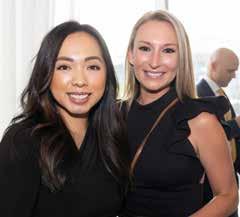

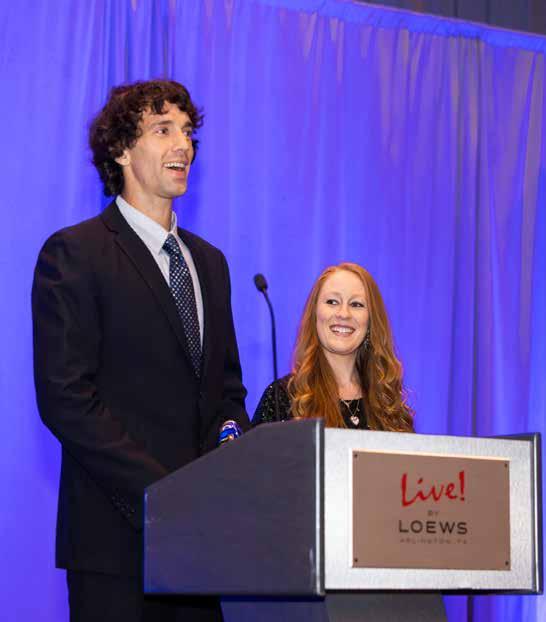
M
4 NEWS & NODS
AVS 100 ELLMAN PHOTOGRAPHY
THE BUSINESS MAVERICK, UTA COLLEGE OF BUSINESS MAGAZINE 5FALL 2022 | UTA.EDU/BUSINESS
ELLMAN PHOTOGRAPHY
Real Estate Conference Connects Developers, Public Officials
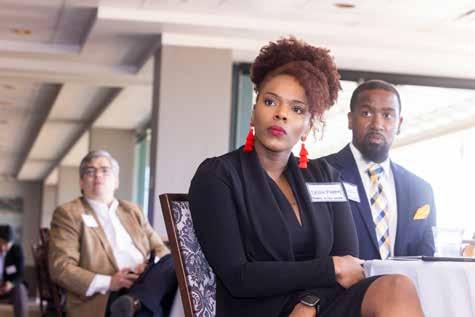
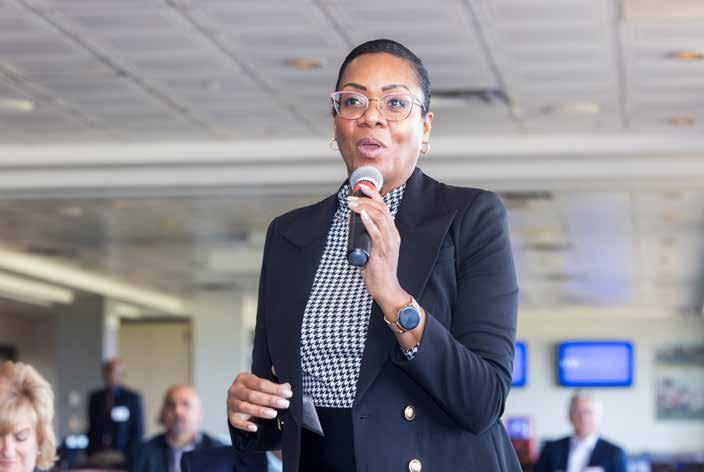
When it comes to com mercial real estate development, city officials and private developers often have different strategies. The public sector, said Sriram Villupuram, an associate professor of finance and real estate, commonly has a perspective much like that of an accoun tant charged with balancing budgets and city services with growth strategies.
The private sector, Dr. Villupuram said, is the investor focused on opportunity risk and costs.
“So that’s why we thought of having public officials speak so private developers could get a take on how they run their city,” said Villupuram, who moderated the College of Business’ Real Estate Confer ence 2022.
Mayors from Richardson, Grand Prai rie, McKinney and North Richland Hills, as well as the former mayor of Arlington, participated in a panel discussion to give
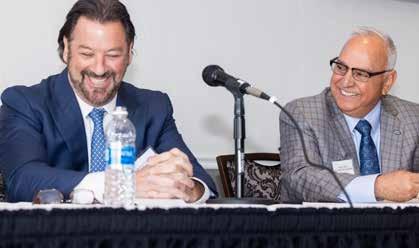
developers an overview of the current Dallas-Fort Worth economic landscape. Villupuram said “we talked about their growth strategies. Some of the cities say, ‘We’re open. We’ll work with you.’ And some are saying we’re pretty close to get ting fully developed.”
The keynote speaker was John Brookby, vice president of commercial development for DFW International Airport. When DFW airport sneezes, Villupuram said, the DFW Metroplex “catches a cold.” Brookby shared his perspective on “what’s happening at the airport, developments within and around the airport on their land and what it means for economic prospects for the DFW area in general.”
The conference was organized by the UT Arlington Ryan-Reilly Center for Urban Land Utilization and the Student Society of Real Estate. Dr. Andrew Hansz is the faculty advisor for the student club. The event was the College of Business’ first
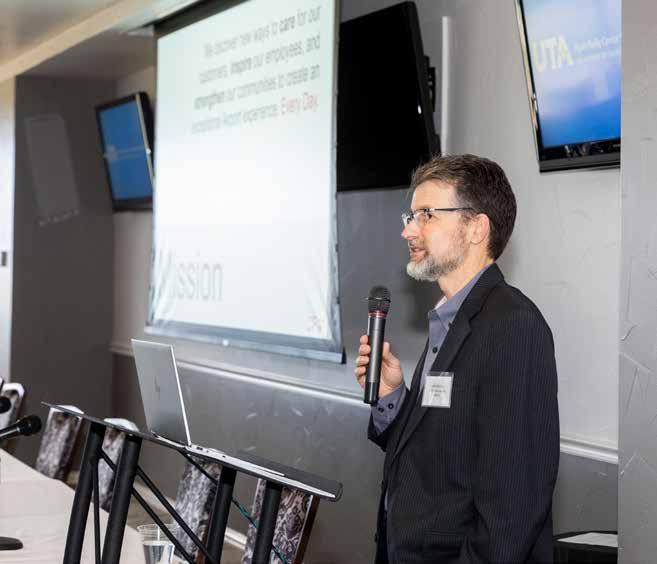
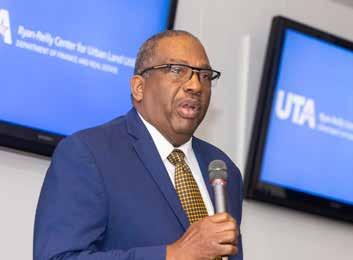
real estate conference since 2015 and drew about 110 attendees. Villupuram said the panel discussion focused on giving de velopers an opportunity to ask questions, particularly about fees that can affect the affordability of housing and their impact on keeping DFW competitive.
“One of the impediments they talked about is impact fees,” said Villupuram, who is director of the Ryan-Reilly Center. “I thought it's high time we speak with government officials to hear their take. The question was how can we keep this (economic pace) going while not disturb ing the balance that we have. We need to make sure that we have enough affordable places to live for people coming in. That was one of the general concerns.”
The Ryan-Reilly Center serves as a bridge between academics and the prac tice of real estate and urban economics. For more information contact Villupuram at sriramv@uta.edu.
The College of Business Real Estate Conference focused on allowing company representatives and public officials to discuss development issues. John Brookby, vice president of commercial development for DFW International Airport (above), was the keynote speaker. Public officials included Sen. Royce West (below right) and, among several mayors who attended, George Fuller of McKinney and Oscar Trevino of North Richland Hills (right). Attendees included Tirsza Brooks with JPMorgan Chase (opposite page) and Deidra Mayberry, executive director of Reading to New Heights (bottom left).
6 7THE BUSINESS MAVERICK, UTA COLLEGE OF BUSINESS MAGAZINE ELLMAN PHOTOGRAPHY
NEWS & NODS
FALL 2022 | UTA.EDU/BUSINESS
Managing Diversity Certificate Program Launched
The College of Business Diversity, Racial Equity and Inclusion (DREI) Group has developed a nine-hour certificate program aimed at helping educate students for an increasingly diverse, glob al job market.
The undergraduate certificate, launched last fall, has one required three-hour course, Managing Diversity in Organizations. Students can choose from five electives for the other six hours. Those include Economics of Discrimination; Interna tional Management; Disability and Work; Interna tional Marketing; and Multicultural Marketing.
The classes are offered in-person and online. The certificate is open to all majors at UT Arling ton.
“The Managing Diversity and Inclusion in Or ganizations certificate will be really beneficial for the students completing it,” said Philisa Stanford, director of the DREI Group. “It's just going to make them more well-rounded and prepare them for the global world.”
That is what Kasandra Jaramillo, a senior undergraduate student majoring in management, thought when she enrolled in the first required certificate course. When she was a high school senior in Dallas, Jaramillo had an internship with IBM. She knew she wanted to major in business but the internship introduced her to human resources.
“I met so many different people from all over the world,” she said. “After completing that internship, I knew that’s what I wanted, a career in human resources, and I wanted to be able to learn more about cultural diversity in a workplace environment.”
The certificate course she completed in the spring satisfied that aspiration, Jaramillo said. “I think enrolling in that course definitely helps me expand my knowledge on diversity and inclusion.” She intends to enroll in two more three-hour courses, focusing on international marketing and management.
BS Economics Degree Program Adds STEM Designation
The Bachelor of Science degree in economics added a fifth statistics-based course that qualified the program to be certified by the Texas Higher Education Coordinating Board as a science, tech nology, engineering and math (STEM) program.

The STEM designation makes the BS Econom ics program more attractive to many students but particularly foreign students seeking employ ment in the United States after graduation, said Roger Meiners, department chair and professor of economics.
“A STEM degree is good when seeking em ployment because it shows you have the ability to work with more technical knowledge,” Dr. Mein ers said. “The market for data analysis is hot. The advantage of our program is that students learn economic intuition about what is driving the numbers they are analyzing.”
For foreign students, a STEM degree designa tion extends their temporary U.S. work visa from
one year to three years, giving them more time to prove their abilities and employers more time to determine if they want to support permanent work status.
The technical coursework is challenging, and not all students "are interested in heavily quan titative courses," Meiners said. "They learn a good bit of statistical analysis through the lens of economics.” But students who complete the STEM coursework “come out with quantitative skills, and they're snapped up and get really good jobs. If they go on to a master's degree in the more technical areas, they get even more reward ing jobs.”
Successfully completing the STEM undergrad uate coursework also makes students better qual ified to go on to graduate school, Meiners said. “With a masters degree you can do even better at the job market,” Meiners said. “So, of course, that's the goal—place students in the job market.”
Honored Alum Addresses 2022 Analytics Symposium
Raj Iyer (MS, 1994; PhD, Electrical Engineering, 1997) served as the keynote speaker at this year’s Business Analytics Symposium. Dr. Iyer, the U.S. Army’s first civilian Chief Information Officer, discussed the military’s needs for analytics skills. The symposium, held each year in March, is a forum for North Texas Artificial Intelligence (AI) and analytics professionals. Two panel discussions covered the status of AI and machine learning technology and ethical and bias issues with each. The panels included experts from a variety of business fields, including aviation, medicine, aerospace and defense, software development, telecommunications, insurance and finance.
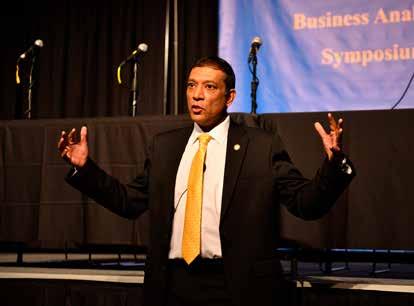
8 9FALL 2022 | UTA.EDU/BUSINESSTHE BUSINESS MAVERICK, UTA COLLEGE OF BUSINESS MAGAZINE NEWS & NODS
ELLMAN PHOTOGRAPHY
Collaboration
Life Lessons from Business Owner and 26-year Tarrant County Leader GLEN WHITLEY
The word collaboration is never far from Glen Whitley’s lips.
The Tarrant County Judge, leader of the Commission ers Court that presides over the county’s governmental responsibilities, repeats the word often during interviews. He writes about it in his quarterly newsletter.
Indeed, while reflecting on the benefit of his accounting degree from the College of Business and the important collaborative role UT Arlington plays in the community, Whitley interrupted the conver sation to take a call from a colleague in Bexar County, home to San Antonio. His medical examiner’s office was swamped after the tragedy in Uvalde; Judge Whitley felt the need to offer assistance from Tarrant County.
Collaboration, after all, has been a consistent theme throughout Whitley’s dual career – one in business, the other in public service. It’s the word he uses to express pride in how Tarrant County has engaged
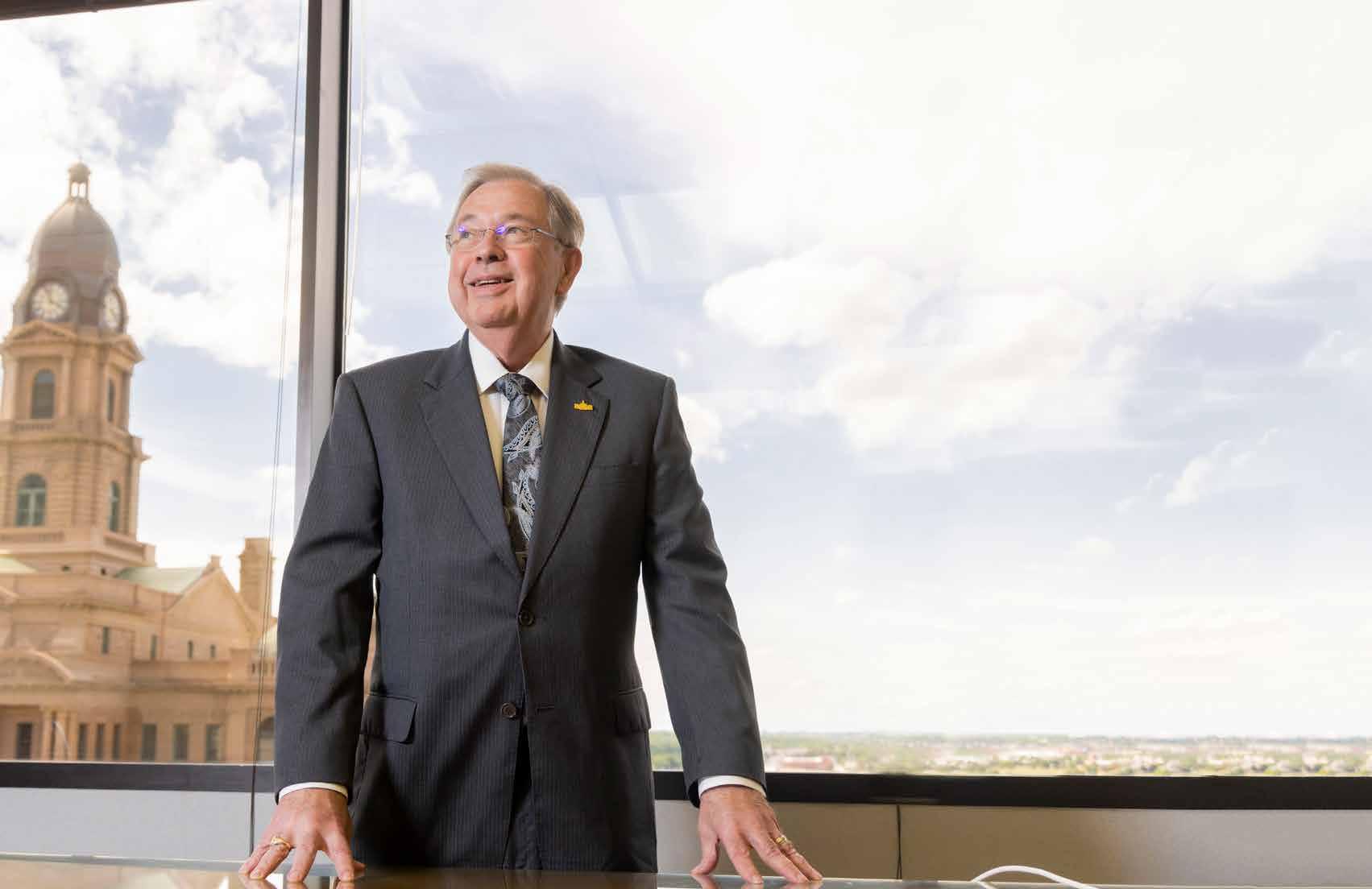
10 11FALL 2022 | UTA.EDU/BUSINESS
ELLMAN PHOTOGRAPHY
101
Continued on next page THE BUSINESS MAVERICK, UTA COLLEGE OF BUSINESS MAGAZINE DISTINGUISHED ALUMNI AND DONOR PROFILE
CONTINUED FROM PAGE 11
in partnerships with private businesses and non-profit agencies, in transportation improve ments and in the economic development that has occurred during his 26 years as commissioner and judge.
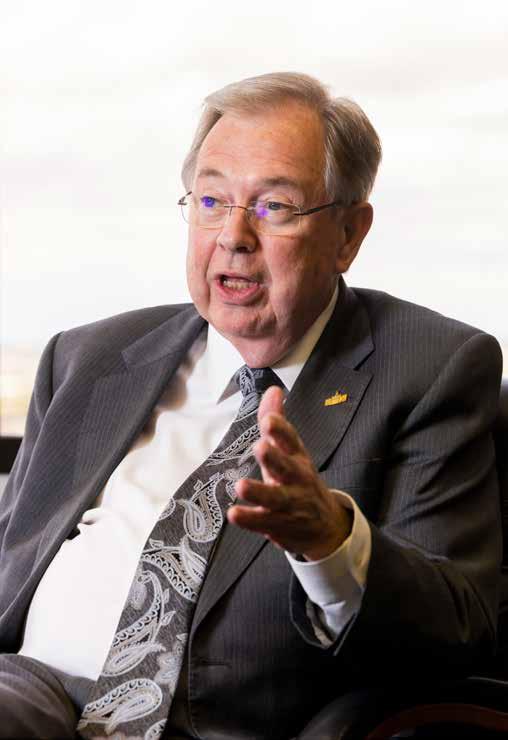
“I would say that collaboration is extended to a lot of things,” said Whitley, who announced he is not seeking re-election for the county-wide position of judge that he held since 2007. “One certainly is the new businesses moving in here and working with cities to not give one an advan tage over another. We do it with transportation projects. I would venture to guess that over the last two decades we have probably spent well in excess of $20 billion on roads in Tarrant County.
“So that's business. That's transportation,” Whitley said. But he quickly and proudly added the human side of the county’s collaborative initiatives, such as the Asthma 911 program that provides emergency assistance to children at their school instead of having to transport them to a hospital.
“We have leveraged and worked very closely with Catholic Charities, the food bank, with childcare services, with the hospitals on health care services,” he said.
UTA leaders, Whitley noted, have been an important part of that community collaboration.
“They have said that we're a part of this com munity, and we want to help,” he said. “They've shown me that it's more than just a place for learning, but it's a place for being involved in and a part of helping the community.”
Whitley, mind you, does not minimize the university’s educational role. “UTA built me,” he said, as well as other local leaders.
Of course, true to his personality, he then poked fun at himself. He offered a story, one his wife Brenda has asked him to stop sharing, about how he wound up in accounting and eventually
co-founded a successful accounting firm, Whit ley Penn.
“I went in to register my junior year, and the lady who was helping us said, ‘What's your ma jor?’ And I said business, and she says no, that's the school you're a member of. You have to have a major. What's your major? And I said, ‘Well, I don't have one.’ She said, ‘Well, you're not going to register today unless you tell me what your major is.’ I said, “What do you got?’ She says, well, accounting. I said I’ll take it.”
Whitley smiled. He had stopped the woman who was listing majors alphabetically at “A.”
“And I swear, if she had told me at that point that you have to take this thing called the CPA exam, you’d be looking at a banker.”
He added quickly, “But I got into accounting, and I’ve never regretted it.”
After graduation in 1976, Whitley worked for two accounting firms but always had thoughts of starting his own business.
“I started work when I was 13 years old. I was dipping ice cream,” Whitley said. “I guess every business I've ever worked in, I have thought, OK, how could I start one of these? And I literal ly did that at the ice cream store. I worked at convenience stores. I worked at construction companies, and I don't think I ever worked in a business that after having been there six months to a year that I didn't start thinking, okay, could I do this?”
He did do this in 1983.
Whitley and two partners, Jim Penn and Mark Topel, founded a public accounting firm that has grown into the fifth largest in North Texas, as ranked by the Dallas Business Journal. Whitley Penn has more than 800 employees in six Texas cities and generates over $200 million in sales.

UTA is more than just a place for learning; it's a place for being involved in and a part of helping the community.
12 THE BUSINESS MAVERICK, UTA COLLEGE OF BUSINESS MAGAZINE
DISTINGUISHED ALUMNI AND DONOR PROFILE Continued on page 14 13FALL 2022 | UTA.EDU/BUSINESS ELLMAN PHOTOGRAPHY
Whitley no longer has a formal business relationship with Whitley Penn, but his years with the compa ny laid the foundation for his public office career, teaching him the value of both accounting practices and, again, collaboration.
“I tell everybody if you're not going to be an accountant make sure you take two or three accounting courses, because whatever you're going to do, that accounting background is going to teach you how to set up a budget, to look at financial statements and to understand how you price things,” Whitley said. “And with that knowl edge, you can start your own business and be successful.”
Still, the technical skills are only half of the equation, Whitley said. Budding entrepreneurs should also understand the importance of having a team with complementary skills.
“I was the guy who could bring in
the business. Penn was our tax person. Topel was the one who could get the work out the door,” Whitley said. “One thing I realized was, it’s great to have a salesman, and that salesman can bring all the business in, but if you don't get it out the door, you're not going to have it very long. So, make sure your team is a complete team that works together and understands that every part is equally important.”
The lessons of collaboration hit home especially hard during the worst months of the pandemic. That is when, Whitley said, many people better understood what a county judge does.
The commissioners court and its coun ty judge do not try legal cases. Whitley is not an attorney. But he is responsible for leading the county’s emergency response efforts.
“I tell people I knew it was in the job description, but I never expected to have to dust it off,” he said. “When
an emergency is declared, you have a lot of responsibilities that you don't otherwise have. And in most of those instances, it's a one- or a two- or a three-day deal. It's a tornado. It's a hurricane that creates people coming up here.”
A global pandemic required new, untested emergency responses. Whit ley knew he needed to engage with all who were impacted.
“It's collaborating with cities and providing assistance and not exercising authority that I now control your city. You know, that just doesn't go over real well,” Whitley said. “Nothing was done in a vacuum. Nothing was done with out them knowing what was coming.”
Whitley said the county’s actions were often determined by orders from the governor’s office and guidelines from the federal Centers for Disease Control (CDC).
“Not that there was unanimous
agreement with what I ended up putting in the orders,” he said. “We listened to public health, but we didn't always agree with public health. I had my top priority in the whole process. Keep the hospitals up. And then after that, keep the businesses open.”
Whitley said he recognized that his decisions “have had and will contin ue to have an impact on kids and on businesses, and it's not something I took lightly. And there was no play book. I would tell people I can only pray that all were the right decisions. But in many instances, we'll never know.”
Whitley said it was important to remain flexible during a time when medical experts were figuring out how to deal with a global pandemic.
“If we try something one week, and we say it didn't work, I have no pride in saying that didn't work. We're going to make a new plan,” he said. “You know, public health, the CDC, was constantly changing. I don't fault them at all for that. I would have faulted them if they realized that something wasn't working and then stubborn ly stuck to it just because they were afraid that they were going to lose some credibility.”
Whitley’s plan was to listen to people: from hospitals, businesses, non-profits, schools and cities. The
county had weekly meetings during the pandemic, which eventually became monthly and then quarterly. Whitley said it was important to hear from constituents. “There's always been somebody down here to tell us what they think, and that's a good thing,” he said.
Whitley reflected some more, then added, “Maybe, as bad as the pan demic was, there were good things that came out. We collaborated. We worked together a lot more. We got to know one another much better.”
Whitley said that, as hard as the pandemic was, it did not influence his decision to not run for re-election.
“When I ran the last time and the campaign was over, my sign guy called and said what do you want to do with the signs, and I said recycle them. I do not plan to run,” Whitley recalled. “So that decision was made before the pandemic hit.”
The answer to the question of what Whitley will do next comes out abruptly before it can even be asked. No, he does not know.
Well, sort of. He does know that his collaborative spirit will continue. The twinkle can be heard in his voice: He plans to sugar up the grandkids, hand them back to their parents, and hit the road with Brenda – at least until he figures out what’s next.
Glen Whitley
UT Arlington Connections
• Bachelor of Business Administration-Accounting, 1976
• President’s Advisory Board
• College of Business-Accounting Advisory Council
• Commencement Speaker, Col lege of Business
Career Highlights
• County Judge – Tarrant County
• Co-Founder – Whitley Penn
• Former Commissioner – Precinct 3, Tarrant County Commissioner
• Former Head of Medical and Professional Department – Rylander, Clay & Opitz
• Former Accountant – Audit Department, Ernst & Ernst
Community Connections
• Board Member – North Texas Commission
• Board Member – National Asso ciation of Counties
• Board Member – Texas Association of Counties
• Honorary Board Member –Northeast Tarrant Chamber of Commerce
• Ex-Officio Member – Texas Association of County Officials
• Past Chairman – Texas Confer ence of Urban Counties
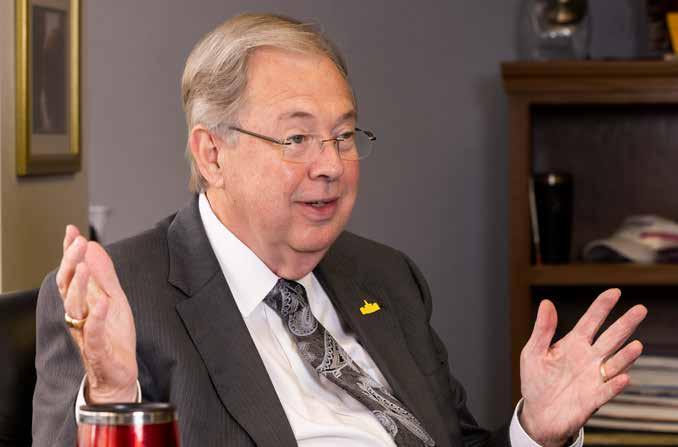
• Member – Texas Society of Certified Public Accountants
• Member – American Institute of Certified Public Accountants
Maybe, as bad as the pandemic was, there were good things that came out. We collaborated. We worked together a lot more. We got to know one another much better.
14 15FALL 2022 | UTA.EDU/BUSINESSTHE BUSINESS MAVERICK, UTA COLLEGE OF BUSINESS MAGAZINE DISTINGUISHED ALUMNI AND DONOR PROFILE
CONTINUED FROM PAGE 12 ELLMAN PHOTOGRAPHY
Research Mavericks
Professor Bin Srinidhi works to arm students with an understanding of financial and management accounting disciplines to help them make better business decisions. His philosophy, which underscores both his teaching and research, is that the bottom line of accounting is accountability: to investors, the company's internal and external stakeholders and society in general.

"Whenever there's a transaction, two parties become accountable to each other, " Dr. Srinidhi said. "Accounting is a crit ical part of accountability, so I consider anything that supports accountability as accounting."
What supports accountability, Srinidhi emphasized, is the quality of information that comes from reporting, analysis and measurement. He said that business man agers must comprehend what is important valuation-relevant information.
“Accounting is an information science, " said Srinidhi, who this year is serving as an editor for two accounting publications, the Journal of Contemporary Accounting and Economics (JCAE) and Accounting Hori zons. “Information is the lifeblood of the integrity of any business and non-business organization. You cannot hold somebody accountable without information, and information has to be credible, believable and trustworthy. And you have to ensure it through some audit process. From the very beginning, I have focused on the idea of accountability and how information feeds into the process.”
Srinidhi's research and journal publica tions cover information economics, corpo rate governance, auditing, internal control systems and capital market research. He recently expanded his focus to include cor porate social responsibilities for diversity
and inclusion.
Bin Srinidhi, PhD
Professor – Accounting
1984 – PhD, Accounting, Columbia University
1982 – M. Phil, Accounting, Columbia University
1975 – MBA, Indian Institute of Management
1973 – B.Tech., Electronics, Indian Institute of Technology
“The accountability concept is changing. It's not just accountability to the investors but accountability to society with multiple stakeholders,” he said.
In 2020, for example, Srinidhi and col leagues published research articles on two social issues: how the inclusion of female directors can demonstrably improve board governance (see Research Spotlight) and the effect political connections – crony capitalism – has on stock price informa tiveness, which is defined as the amount of information that stock prices contain about future earnings. More informative stock price changes contain more informa tion.
“I was teaching in Hong Kong, and I was interested in how the Chinese companies
work versus U.S. companies,” Srinidhi said. “We looked at political interference and how politicians can be held accountable by accounting and auditing the companies they manage.”
Throughout his academic career, Srinidhi has been an author of various publications that examine the effects of high-quality auditing and financial report ing on information provided to investors and other stakeholders and the governance of public corporations. This year Srinidhi is serving as the editor of a book for World Scientific Publishers on the social and business effects of diversity, equity and inclusion (DEI) initiatives.
“Accounting is not just a set of rules,” he said. “Of course, you should know the rules, but you should know why the rule is
there – how it helps in the flow of cred ible information and how it improves accountability, and in some cases where finance is involved, how we can improve the pricing of assets. And it's a question of how do you hold lower-level managers accountable to the firm's strategy and operations.”
Srinidhi, the Carlock Endowed Distin guished Professor and his department's PhD coordinator, said accounting and non-accounting students alike should be challenged to think about how account ability plays into the whole idea of a business.
“I mean, what happens if a business is not accountable?” he asked. “Normally, the business fails.”
TITLE: How do female directors improve board governance? A mechanism based on norm changes.
Journal of Contemporary Accounting and Economics, 16 (2020 Online), 17. https://doi.org/https://doi.org/10.1016/j.jcae.2019.100181
SRINIDHI'S SUMMARY:
When one of his colleagues became the first and only female member of a corporate board of directors, Srinidhi said she nervously approached the first meeting by preparing extra hard, study ing the company's scope, its products, competitors and strategic potential. However, she was surprised to discover at the meeting that her male colleagues knew less than her about each of these aspects of the business.
“Almost immediately, she gained respect because she was able to talk a lot about this company and was on the same wavelength as the management,” Srinidhi said. “She was able to suggest where the company could expand. And she said at subsequent board meet ings, the other directors seem to come better prepared.”
For both Srinidhi and his colleague, her experience sparked a research curi osity: Does board governance improve when female directors are added to all-male boards? “We said, okay, let's see whether this is a general thing that goes on or it's just you and this com pany,” Srinidhi said. “So, this is how our research on gender diversity started.”
Firms with greater female partici pation on boards exhibit high earn ings quality and a richer information environment for investors. Srinidhi coauthored two research papers in 2011 in Contemporary Accounting Research (CAR) and in the Journal of Account ing and Economics that expanded on prior studies that indicated female participation is associated with better board monitoring. This finding aligned
with his colleague's experience. Srin idhi's studies provided evidence that improved earnings quality and a richer information environment are tangi ble consequences of a higher level of monitoring. In 2017, Srinidhi coauthored another CAR article in which the find ings suggested that boards and audit committees with female directors are likely to demand higher audit quality.
In this recent study, published in 2020 in the Journal of Contemporary Accounting and Economics Srinidhi and his coauthors identified how female directors produce better governance by changing the board's norms. Inde pendent female directors, compared to their male counterparts, are more effec tive at changing board norms (board processes) and improving governance (board outputs). In effect, even with a minority on the board, female directors affect changes in the board outcomes.
“The board and the audit committee work differently when female directors are present. So, we argued that women act as catalysts,” Srinidhi said. “The introduction of women onto the boards acts as a catalyst and changes the inputs to the board and the outputs. So that is how the board functions them selves become different.”
Srinidhi is now expanding his re search to analyze the impact of other forms of diversity – race, ethnicity, age, culture, expertise – on board gover nance and functions. “I was developing this idea that, ultimately, it has to be a question of diversity of ideas,” Srinidhi said. “All of these things can lead to a diversity of ideas. "
PUBLISHED RESEARCH:
The Journal of Accounting and Economics, The Accounting Review, Contemporary Accounting Research, Review of Accounting Studies, Management Science, Journal of Accounting and Public Policy, and Journal of Accounting, Auditing, and Finance, among others.
The accountability concept is changing. It's not just accountability to the investors but accountability to society with multiple stakeholders.
16 17FALL 2022 | UTA.EDU/BUSINESSTHE BUSINESS MAVERICK, UTA COLLEGE OF BUSINESS MAGAZINE
RESEARCH SPOTLIGHT
FACULTY RESEARCH
C.Y. Choi, PhD
2000
1996
1995
1990
Economics professor C.Y. Choi knew when he worked in the research department at The Bank of Korea in Seoul in the mid-1990s that he needed better tools to understand how economic theory could be applied to real-world, on-the-ground economic issues.
“It was a kind of soul searching. I found out that I didn’t have enough knowledge about what I was doing,” Dr. Choi said. “I wanted to know more about what I can do and how I can do it better. And more importantly, why I am doing that.”
Those ever-present questions led him to pursue graduate degrees at The Ohio State University, and they continue to drive his motivation to apply economet ric techniques using time-series data to “analyze what is going on in reality in the field of macroeconomics and international finance,” Choi said. His research has covered a variety of top ics, including the dynamic behavior of rela tive prices and its implications on monetary policy for open economy macroeconomics and finance, often with a regional or loca tional focus. Choi attempts to understand whether economic issues are idiosyncratic to each region or do they have common ties that can be applied broadly.
Choi strives to better understand, for example, “how one state is growing faster than others or how localities do better than others.”
Choi added, “My research interest and topics have changed over time and are more and more focused on the application of em pirical tools to address questions I had. For example, why are prices moving in different
ways across products and across locations? And why the inflation rate has or hasn’t changed and what contributions are made by the policymakers? What implication does it have on the welfare of the people in the economy after the policy actions are taken?”
Choi currently has a journal article under review that examines the impact of political uncertainty on different U.S. housing markets (see Research Spotlight), using county-level data to understand the nuanced local implications on home prices.

Home ownership, which reflects both polit ical participation and a wealth portfolio for many Americans, plays an important role in the effect of political uncertainty.
On a different research track, he has funding from the National Oceanic and Atmospheric Administration (NOAA) to identify and quantify the economic benefits of measures taken to reduce flood risks and impacts to the water supply infrastructure. His study, in collaboration with civil engi neers, is focused on southeast Texas, where areas such as Jefferson and Orange counties have suffered severe hurricane damage. To gether with his collaborators, he has found that natural disasters like hurricanes have enormous indirect and spillover effects that are hardly captured by the published data. These are the types of real-world issues,
with both personal and broad economic effects, that motivate Choi’s research. He often uses time series data analysis tech niques, studying data recorded at consis tent intervals to determine how variables change over time, and how time as a critical event itself can affect changes in the data and thus the conclusions drawn from it.
Using information over time, Choi said, can help predict what trends might come next (although with margin of errors).
“Time series data has some trend or some cyclical pattern with a certain regu larity and it fluctuates with ups and downs. We are trying to utilize that property to forecast or predict how the data will behave down the road,” Choi said.
Studying the past using time series processes to help understand the future extends to Choi’s teaching philosophy. He illustrates his belief with the words of French existentialist playwright and novel ist Jean-Paul Sarte, who espoused that life is C between B and D: Choices between Birth and Death.
“If you wonder why you are here,” Choi tells his economics students, “you have to look back at what you have done in the past. At the same time, if you wonder where you will be in the future, you have to ask yourself what am I doing now.”
RESEARCH SPOTLIGHT
TITLE: Influence of State Political Uncertainty on Local Economy: A Tale of Two Markets Paper under review
CHOI’S SUMMARY:
In this study, Choi analyzes a 25-year data set from 1,358 counties in 33 states comprising 70 percent of the U.S. population. He sought a nuanced, localized understanding of political uncertainty on a significant personal wealth asset – homeownership.
Existing research, Choi writes, finds that uncertainty around elections can have negative financial effects, but few studies have focused on housing prices, particularly at a subnation al level. Choi’s research shows that elevated political uncertainty leads to slower growth, but this varies widely across locations. The impact is stronger in areas with higher rates of homeownership, which Choi surmises is likely because homeowners are more sensitive to possible changes in policies and regulations.
“Any uncertainty coming from the political side has consequential effects on economic ac tivities,” Choi said. “Firms might be reluctant to do more investment, and consumers are afraid of spending more than before. So that’s pretty much the nature of a human being in response to any uncertainty.
“In my paper, uncertainty is defined as how close the election, especially a gubernatorial election, is. I found that, the closer the guber
natorial election is, it has a negative impact on local housing prices, especially at the county level. In counties that have closer (gubernatori al) elections they had on average experienced lower growth in housing prices.”
The study uses data on the vote margins between two top contenders. A vote margin of less than 5 percent suggests a tight race and higher political uncertainty. For housing data, the research uses county-level annual house price indexes from the Federal Housing Finance Agency (FHFA).
Even during current times in which lowcost financing and low housing inventory have contributed to high price increases, Choi said his study shows that the relative level of the price growth is still influenced by political uncertainty.
“My data set actually does not cover this kind of exceptional period, except that there is one time period when the housing market was booming in the 2000s but then crashed,” Choi said. “But my research can tell that even in this kind of high, fast-rising housing price environment, in any location with more political uncertainty, they might enjoy lower growth compared to others who do not have such political uncertainty.”
PUBLISHED RESEARCH: Journal of Economet rics, Journal of Money, Credit and Banking, The Econometrics Journal, Journal of Economic Dynamics and Control, Oxford Bulletin of Economics and Statistics, Journal of International Money and Finance, Eco nomic Inquiry, Journal of Regional Science, Economics Letters, Canadian Journal of Economics, Journal of Construction Engi neering and Manage ment, and Journal of Financial Stability among others.
If you wonder why you are here, you have to look back at what you have done in the past. At the same time, if you wonder where you will be in the future, you have to ask yourself what am I doing now.
18 19FALL 2022 | UTA.EDU/BUSINESSTHE BUSINESS MAVERICK, UTA COLLEGE OF BUSINESS MAGAZINE FACULTY RESEARCH
Professor – Economics
– PhD, Economics, The Ohio State University
– MA, Economics, The Ohio State University
– Certificate, Financial Programming and Policies, The International Monetary Fund
- BA, Economics, Kyungpoo National University
RESEARCH SPOTLIGHT
Traci Freling, PhD
Professor – Marketing
2001 – PhD, Business Administration – Marketing, Texas A&M University
1996 – MS, Marketing, Texas A&M University
1992 – BS, Marketing, Texas A&M University
In her doctoral studies at Texas A&M University, Traci Freling took a course on meta-analysis methods. The class covered statistical processes for examining data from multiple primary studies that are focused on similar research questions in an effort to find commonalities or trends.

It was not, Dr. Freling said, her favor ite class. She loved studying consumer behavior and had a minor in psychology.
Now, Freling said, consumer behavior still drives her research but meta-analy sis is her niche.
“I didn't love it at the time,” she said, “but I have come around on that. It's a bit of an obscure methodological and an alytical approach” and she now appreci ates that, through meta-analytic meth ods, “you synthesize decades of research and quantitatively answer questions that no one study can.”
Before joining the College of Business, Freling worked as a marketing research analyst with a company that had numer ous advertising agencies and top-brand clients, such as SnackWells, Samsonite, Frito-Lay, JCPenney and Brinker Inter national.
She turned her corporate experience into a teaching and research passion. Her focus is on how consumers process ad vertising and promotional information, make purchase decisions and evaluate brands. From the company’s perspec tive, she studies the value and impact of branding strategies and researches
how to measure, build and defend brand equity.
She also teaches theory-building through meta-analysis. “I’ve been able to carve out a little niche for myself,” she said. “I teach a meta-analysis semi
rizing what is known.”
Freling said a meta-analysis helps researchers refine future experiments.
“If you do it effectively, you also give yourself a little bit of a head start advan tage on future experiments and studies
sales. One of her current projects shifts her research from corporate marketing to the non-profit sector.
“We are doing a meta-analysis on studies that look at something called overhead aversion,” Freling said, “which is, why is it that people are so reluctant to give to a charity if they perceive that they spend too much money? Everyone knows you have to spend money to make money.”
Freling often works with col leagues with expertise in other disciplines that are related to mar keting for the purpose of building theoretical frameworks, which all helps to “understand why it is that consumers behave the way they do,” she said. “We borrow from psychology and sociology and communications and economics and management, even anthro pology.”
The cross-disciplinary approach fits the meta-analysis approach.

“You know,” she said, “all of that is really about persuading people, and that was one of the topics that I always found interesting back when I worked in industry, and what I have focused on since.”
TITLE: When Do Product Crises Hurt Business? A Meta-Analytic Investigation of Negative Publicity on Consumer Responses
Journal of Business Research
FRELING’S SUMMARY:
When companies deal with a product or service problem that generates negative publicity, the strategies to address the issue require a nuanced understanding of the varying levels of emotional response by consumers.
“We can all think of a brand that has offended us or a company that has disappointed us in some way,” Freling said. “And this paper is all about when a company’s missteps matter more and when they matter less to consumers.”
The meta-analysis by Freling and her colleagues extended prior research that product crises negatively affect consumer responses to show that the magnitude of negative information effects is dependent on characteristics of the crisis, the product and target consumers. The impact is more pro nounced, Freling’s study shows, when threat severity is high, the product failure is performance-related, con sumer health is at issue, the product is directly involved in the incident, and affected consumers are from a high power-distance culture, which is one in which residents in a country tend to accept and endorse hierarchy and inequalities in power. Individuals from high power-distance countries are more sensitive to risk and less tolerant of uncertainty than those from low power-distance countries.
Freling and her co-authors applied
statistical methods to quantitatively summarize the results of previous stud ies. They determined that, although conventional wisdom suggests that any product crisis will impair a compa ny, that this is not necessarily the case. They documented when the nega tive effects of product crises are less impactful and developed a theoretical rationale for the equivocal findings on product crisis effects. In exploring boundary conditions of negative prod uct information, the study provided a more nuanced understanding of when and why some brands appear to be immune to the fallout that typically accompanies a product crisis.
“This paper explores how consumers react when they hear negative infor mation,” Freling said. “Our next step is looking at the next link, which is, okay, now the bad thing has happened, and consumers are negative towards your company, what is the crisis response management strategy going to be? What works best at bringing consum ers back?”
PUBLISHED RESEARCH: Organizational Behavior and Human Decision Processes; Risk Analysis: An Official Publication of the Society for Risk Analysis; Journal of Retail ing; Marketing Management Journal; Journal of Advertising Research; Journal of the Academy of Market ing Science; Journal of Consumer Psychology; Psychology & Marketing; and Journal of Product and Brand Management, among others.
20 21FALL 2022 | UTA.EDU/BUSINESSTHE BUSINESS MAVERICK, UTA COLLEGE OF BUSINESS MAGAZINE
FACULTY RESEARCH
Clinical Professor Has a Passion to Improve Online Teaching
Long before the Covid pandemic forced universities to increase virtual courses, Christy Spivey recognized both the potential of online classes and the need to improve teaching methods to better engage students.
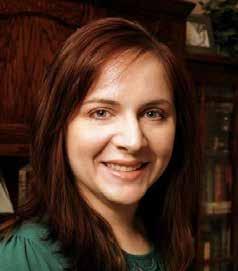
She started with trying to better herself, earning online teaching certifications. She now serves as co-chair of the Online Teach ing Evaluation Task Force in the College of Business with a goal of helping other faculty improve as well.
“I've been involved in online teachings for seven or so years,” Dr. Spivey said. “I had my online teaching certifications in 2016, and I was teaching quite a bit online before the pandemic. I actually helped a lot of faculty transition to online teaching during the pandemic.”
To look at Spivey’s background is to see that she engages in every opportunity to improve any manner of education. But her focus is online teaching.
“I’m motivated by my desire to improve, especially online teaching at UTA,” Spivey, a clinical professor in the economics depart ment, said. “I'm a big advocate for quality online teaching because I know in the past it's gotten a bad rap. Students would think, oh, it's going to be easier than an in-person class. So, I'm trying to really change that stigma, because I do believe that it can be done well if the effort is put in.”
When the pandemic disrupted tradition al classroom teaching, Spivey saw how she could help other professors transition to online using Canvas, the university’s cloudbased learning management system.
“I created these 10-minute or less videos to help faculty figure out how to do things in Canvas that I thought would be import ant for them to know,” Spivey said. “And then that led to my transition into an online Canvas teaching site for faculty. I had a colleague help me build this site, and I do
consulting with faculty one-on-one.”
Now Spivey is introducing instructors to an interactive content platform, H5P, that works with Canvas. “I'm teaching faculty how to use this cool technology, or using it in my online classes. It allows you to insert interactive games and questions throughout your online course,” Spivey said.
Last year, Spivey received the UTA Provost’s Award for Excellence in Teaching and the College of Business Clinical Faculty Teaching Award. She typically teaches two to three classes each semester in healthcare and human resources economics and eco nomic data analysis. Plus, she keeps a hand in academic research.
She is chair of the Assessment of Learn ing Committee, which evaluates how well the college is meeting accreditation standards. She led the effort to redesign the bachelor’s of science in economics, was involved in the evaluation of the mas ter’s program and continues to serve on the economics department’s curriculum committee. She also participates in the newly formed Diversity, Racial Equity and Inclusion Committee.
She sees advantages to both online and in-person teaching and prefers a blended approach “where it’s the best of both worlds. You would meet once a week instead of twice, for example, and then you would have the rest of the content online.”
Spivey believes there are opportunities to engage online students if instructors work at improving their online presence, espe cially when classes are asynchronous.
“For face-to-face, I think most people would say, it's so much easier to connect
with your students,” Spivey said. “When you have them in class, they can ask questions in real time, and so that's a huge plus. I think it's harder online to create that connection. But although you may not be able to achieve it to the same level as an in-person class, it’s still doable to create instructor-student interaction and instruc tor presence for online classes. In some ways, it's easier to get students to participate in discussion. For example, shy students who don't want to speak out in class will get involved in online discussions much more readily.”
Spivey recognizes that the flexibility of online classes means many students will prefer them, pandemic or no pandemic, and as communication platforms such as Microsoft Teams improve, she is optimistic that online teaching and student engage ment will as well.
“Certainly, online classes aren’t for everyone, but thankfully technology has improved,” Spivey said. “It’s a lot easier now because things that weren't possible 10 years ago are now.”
Business Students Earn High Rankings in Marketing Competition
Three College of Business students placed fourth and sixth overall among 55 teams competing in business simu lations at the American Marketing Association (AMA) 2022 International Collegiate Conference.
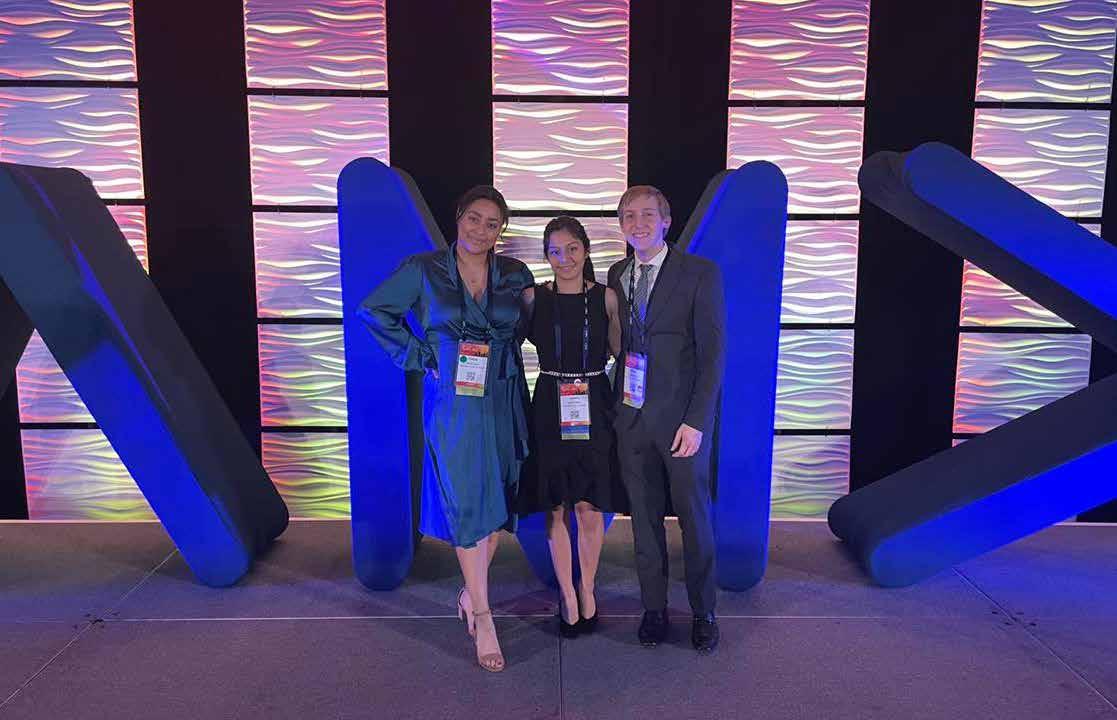
Jasmin Mejia, Felicia Urban and Ethan Wood said they successfully applied classroom lessons to finish fourth, the highest ranking of any Tex as university, in a simulation that rat ed teams on financial and marketing performance and marketing effective ness. In a second simulation, in which the three placed first in their grouping and sixth overall, the students were required to use forecasting skills, create new research and development projects and increase profit margins. The sixth-place finish was the sec
ond-highest of any Texas team.
“Across all of the competitions in which I participated one common theme is that they all felt so real,” Wood said. “We were all tasked with analyzing business statistics, working in fast-paced environments and di viding sizeable responsibilities. These skills are all essential in our modern business workforce. The judging tended to be very objective and re sults-based, taking into consideration the impacts of our team’s decisions.”
The College of Business contributed funding for the students to attend the conference, which annually draws about 1,000 marketing professionals and students from national and inter national universities.
“The opportunities to learn are
endless,” said Urban, who serves as executive vice president for the AMA’s student group. “I found myself using a lot of what I am currently learning in my marketing and management courses within the competitions.”
The conference was a first for all three students. Wood said, “my key takeaway is to be a risk-taker. The only way to grow is to push yourself to engage with a real challenge, and that is exactly what I did by attending the conference.”
Mejia, who serves as AMA student president, said attending conferences allows students to apply education in a real-world setting and build community around shared interests. “There are no negative consequences when joining an organization. It is the best way to find everything you have been searching for,” she said.
Felicia Urban, Jasmin Mejia and Ethan Wood attended the American Marketing Association 2022 International Collegiate Conference.
22 23FALL 2022 | UTA.EDU/BUSINESSTHE BUSINESS MAVERICK, UTA COLLEGE OF BUSINESS MAGAZINE STUDENT SPOTLIGHT
FACULTY SPOTLIGHT
Goolsby Scholars at Home and Abroad
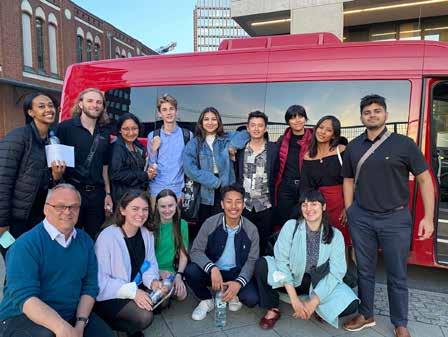
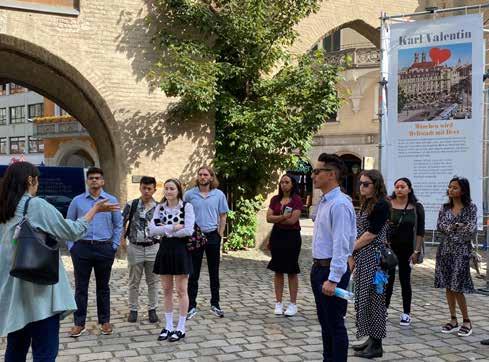
Medallion Ceremony Recognizes Cohort 17
John and Judy Goolsby, name sakes of the Goolsby Leadership Academy, congratulated members of the 17th cohort at a medallion ceremony that recognizes the students’ accom plishments. The Goolsbys helped create, fund and launch the program for College of Business scholars in 2003. John Goolsby told the students that credit should go to numerous UTA colleagues and donors for envisioning and sustaining the initiative, which he said had a simple goal: developing grad uates who employers want to hire. One of those graduates,
Will Gough (BS, Accounting, 2016; MS, Accounting, 2018), served as keynote speaker and shared advice he absorbed both through the academy and during his career as comptroller of the Dallas Mavericks basketball organization. Gough summed up his advice with the acronym PAGE1. Perspective (put yourself in another’s shoes); Authenticity (be true to your best self); Gratitude (be thankful for good things in life); Empowerment (allow yourself and others to learn from mistakes); and 1 (strive to make anything you do at least 1 percent better).

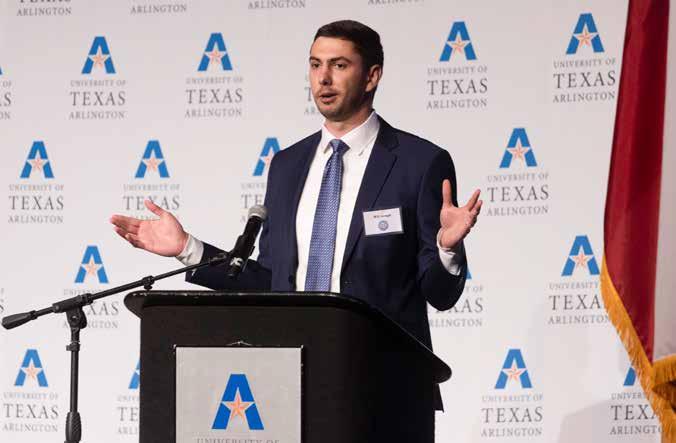
Goolsby in Germany
 Led by Goolsby Director and Clinical Professor Jerry Hubbard, students toured overseas to learn from representatives of businesses and a university in Germany. The program was suspended during the 2020 academic year because of COVID. Academy scholars this year visited Munich, Rothenburg, Augsburg, Nuremberg, Dachau and Berlin.
Led by Goolsby Director and Clinical Professor Jerry Hubbard, students toured overseas to learn from representatives of businesses and a university in Germany. The program was suspended during the 2020 academic year because of COVID. Academy scholars this year visited Munich, Rothenburg, Augsburg, Nuremberg, Dachau and Berlin.
24 25FALL 2022 | UTA.EDU/BUSINESSTHE BUSINESS MAVERICK, UTA COLLEGE OF BUSINESS MAGAZINE
STUDENT SPOTLIGHT
ELLMAN PHOTOGRAPHY
From the Minds of the Professionals
The 2022 spring Business Week afforded students opportunities to hear from alumni and business professionals who shared experiences and success stories. The event included 51 speakers and 14 panel participants from a range of industries: banking, real estate, marketing, professional sports, airlines and auto motive, among others. One speaker, 2022 Miss America Emma Broyles, talked about the challenges she faced in college and discussed her mission to connect students from all walks of life through a social impact initiative. Broyles, the first Alaskan and Korean American to win the Miss America title, received a UTA jersey from Alex Hummer, a member of the Movin’ Mavs wheelchair basketball team.
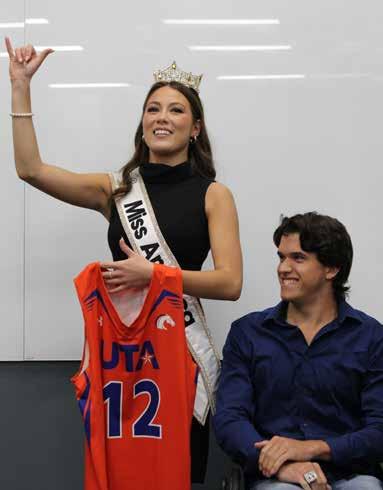
First Floor Gets Facelift to Enhance Engagement

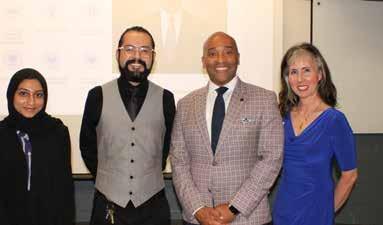
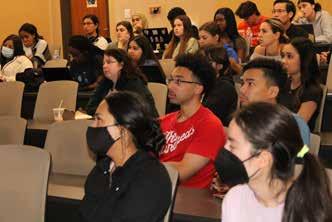
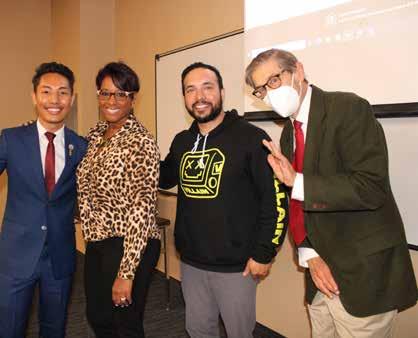
The College of Business Café and Employer Foyer received an updated look over the summer to provide students with improved space for informal meetings. The first-floor area is envisioned as not only a location for student gatherings but also a spot where employers can meet with potential new employees.

 PHOTO BY JORDAN MULKEY
PHOTOS BY MYALINDA MARTINEZ
PHOTO BY JORDAN MULKEY
PHOTOS BY MYALINDA MARTINEZ
26 27FALL 2022 | UTA.EDU/BUSINESSTHE BUSINESS MAVERICK, UTA COLLEGE OF BUSINESS MAGAZINE
STUDENT SPOTLIGHT
Engaging
Students and …
The College of Business sponsored a Business Student Organization Fair to encourage students to learn more about and join one of the 19 student business organizations in the college. And, of course, offering food cer tainly helps to get students involved. The clubs provided coupons for a food truck brought in to support the event.
For more information about our student organizations visit go.uta.edu/business-orgs
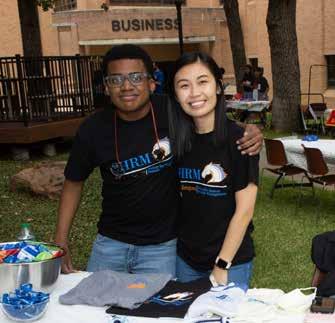
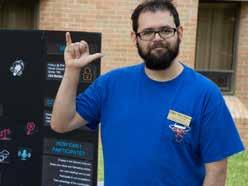
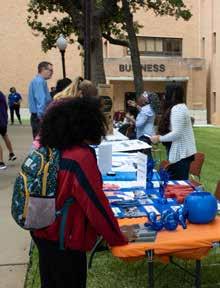
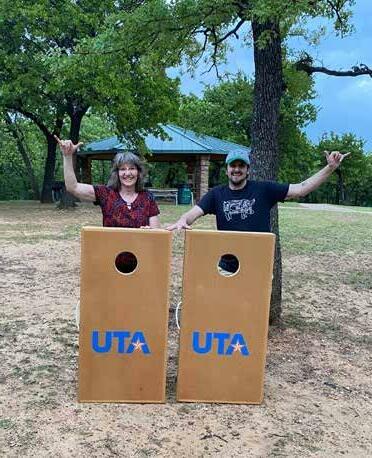

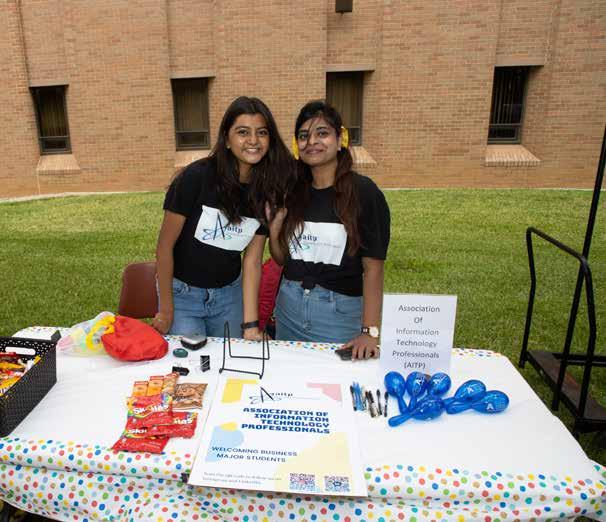
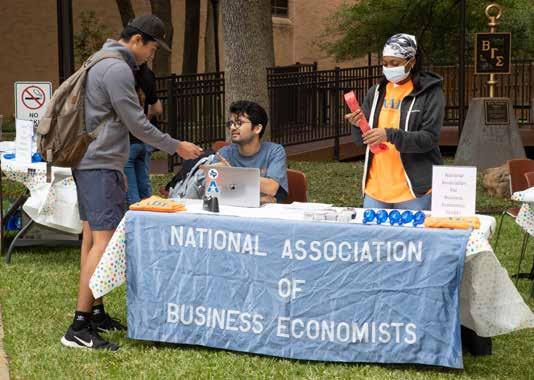
… Engaging Alumni
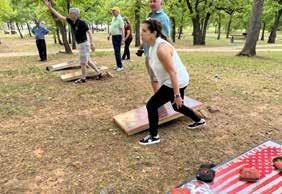
The Dean’s Leadership Circle (DLC) appealed a bit to college-days memories and perhaps some competitive spirit by hosting the first Cornhole Contest for its alumni members. Angela Frazier and Rob Comer (BS, Economics, 2010; MA, Economics, 2012) teamed up to win the event, although the big winners are business students who have access to $490,000 for scholarships, which are funded by members’ dues.
Visit go.uta.edu/DLC to learn more.
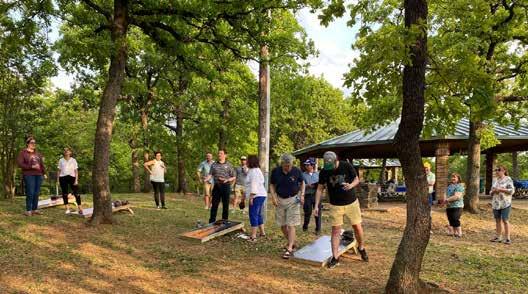
28 29FALL 2022 | UTA.EDU/BUSINESSTHE BUSINESS MAVERICK, UTA COLLEGE OF BUSINESS MAGAZINE
STUDENT SPOTLIGHT
Passion, Inspiration, Aspiration
Before taking over in April as the 10th presi dent of The University of Texas at Arlington, I knew UTA was an institution brim ming with talent, innovation, and promise. In the first months in my new role, I’ve learned it’s all that and even so much more. I’ve had the opportunity to meet thousands of members of the Maverick family, including students, alumni, staff, faculty, community leaders and elected officials. At each encounter, I’ve gained a greater appreciation for the passion of our students; the leadership and expertise of our staff and faculty; and the global power, influence and impact of our 250,000-strong alumni.

To be a Maverick is to be part of a worldwide community of leaders, thinkers and differ ence-makers.
The College of Business is proof of the power of a UTA education. Among the College’s 60,000 alumni there are cur rently nearly 250 CEOs, more than 300 CFOs and nearly 1,000 vice presidents.
Talk about difference-makers: Our Business alumni include Gen. Michael Langley, the first Black four-star general in the history of the Marine Corps;
Jacqualyn Fouse, CEO of Agios Pharmaceuticals; and longtime Tarrant County Judge Glen Whitley, recipient of our 2016 Distinguished Alumni and Community Service Award for his volunteer efforts supporting higher education and military veterans.
Our faculty and staff in the College of Business prepare students for success in public service, private enterprise and in life. And they do so in one of the strongest economies anywhere. When Mavericks graduate, they gain access to jobs at 22 Fortune 500 companies headquartered in the North Texas region—the fourth most in the U.S.—and earn the highest first-year sal aries of graduates from any non-medical UT System institu tion.
As someone raised in Arlington, I’m proud that UTA looks like the community we serve. Among our 6,300 College of Business students are almost 2,500 first-generation students and nearly 400 military-affiliated students. With our commitment to making college education affordable, we have the passion and the programs to provide access to a college education for ordinary Texans and help them
lead extraordinary lives.
I repeatedly find myself energized by your talent and accomplishments and inspired to chart a course that may sound aspirational, but that I firmly believe is attainable. My vision is that UTA can be one of the nation’s most inclusive and impactful research universities. We owe it to ourselves and to the state of Texas to achieve this goal. Our state needs us to dream big.
Based on the talent and com mitment I see all around us, I am confident in our ultimate success.
Jennifer Cowley, PhD UTA President
OUR UTA COLLEGE OF BUSINESS ALUMNI EMBODIES THE MAVERICK SPIRIT.
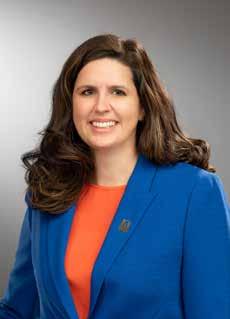
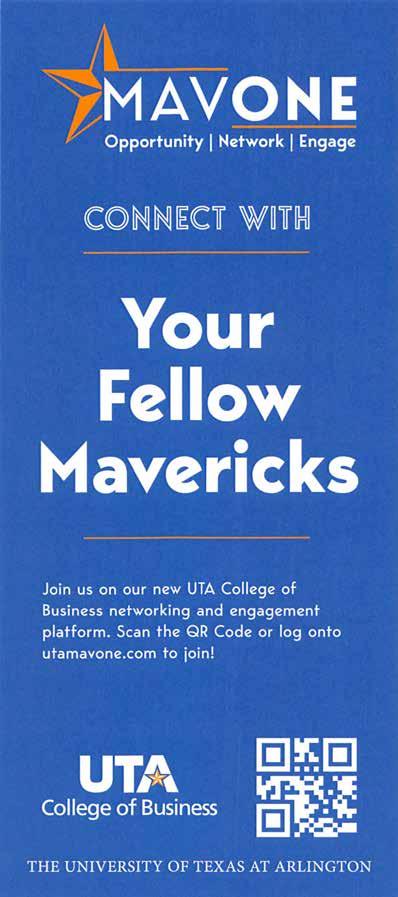
You are blazing a path to success in unique and incredible ways. We want to congratulate you on your recent promo tion, the new business you just launched, the dream job you landed, the nonprofit board position you accepted, a marriage to celebrate, or a future Maverick to wel come into the fold. Every step, large or small, deserves a celebration.
Share your journey with us at collegeofbusiness@uta.edu.
We are PROUD of YOU. Mav UP!
30 31FALL 2022 | UTA.EDU/BUSINESSTHE BUSINESS MAVERICK, UTA COLLEGE OF BUSINESS MAGAZINE PRESIDENT'S LETTER
Become a member of the Dean’s Leadership Circle:
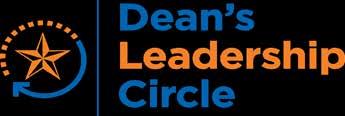
• Impact student success through scholarship development and awards,

• Receive exclusive networking and professional development opportunities, and

• Contribute to advancement, development, mentorship and alumni engagement as an ambassador for the Collge of Business.

Box 19377 701 S. West Street, Arlington, TX 76019-0121
go.uta.edu/DLC






































 Led by Goolsby Director and Clinical Professor Jerry Hubbard, students toured overseas to learn from representatives of businesses and a university in Germany. The program was suspended during the 2020 academic year because of COVID. Academy scholars this year visited Munich, Rothenburg, Augsburg, Nuremberg, Dachau and Berlin.
Led by Goolsby Director and Clinical Professor Jerry Hubbard, students toured overseas to learn from representatives of businesses and a university in Germany. The program was suspended during the 2020 academic year because of COVID. Academy scholars this year visited Munich, Rothenburg, Augsburg, Nuremberg, Dachau and Berlin.






 PHOTO BY JORDAN MULKEY
PHOTOS BY MYALINDA MARTINEZ
PHOTO BY JORDAN MULKEY
PHOTOS BY MYALINDA MARTINEZ














